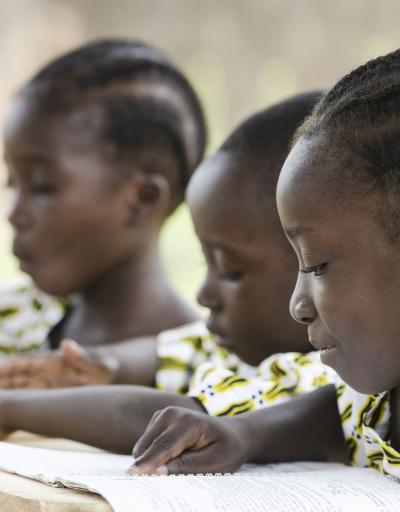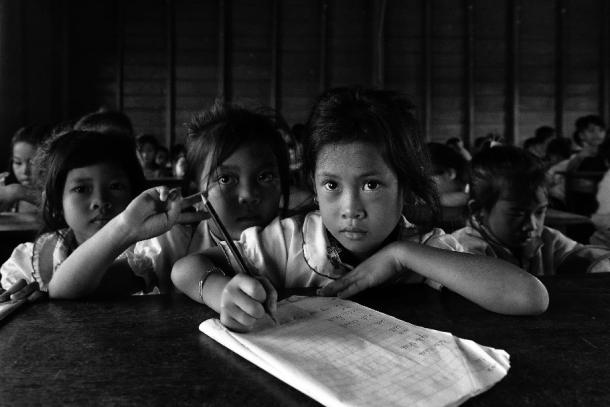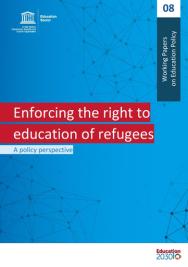
Ensuring the right to education for vulnerable groups

All people have the right to non-discrimination and equality in education. Despite progress made over decades, vulnerable groups, such as girls and women, refugees and migrants and persons with disabilities, are more likely to suffer from educational inequalities and face discrimination.
With the SDG4-Education 2030 agenda, states committed to 'Ensure inclusive and equitable quality education and promote lifelong learning opportunities for all'. To guide Member States to achieve this goal, UNESCO seeks to provide guidance by identifying challenges, clarifying international human rights obligations and rights and sharing good practices. In addition, UNESCO closely monitors the implementation of the right to education of all vulnerable groups.
Refugees
With over 20.7 million people who are currently refugees, challenges are numerous in relation to access, quality, and equity. Yet education plays a key role in ensuring refugees can fully develop themselves, find a job and contribute to society. UNESCO has produced two papers which analyze how to protect and enforce the right to education of refugees.


An international expert meeting on public policies supporting the right to education of refugees was held on Human Rights Day 2018.
More information on the right to education for climate displaced persons.
Persons with disabilities
Despite the Convention on the Rights of Persons with Disabilities (2006) and other instruments that aim to ensure their inclusion, persons with disabilities continue to be excluded from mainstream education in some countries. When they do have access, schools are often not equipped to cater to their needs or allow them to reach their full potential. Where states do offer specialized schools, they do not always accommodate the diversity of educational needs.
To share state practices, UNESCO has produced a thematic report based on the Ninth Consultation on the 1960 Convention and Recommendation against Discrimination in Education which analyzes the measures taken by states to support the right to education for persons with disabilities.

Minority groups and indigenous people
Minorities and indigenous people require an education system that respects their cultural, linguistic and religious needs and allows them to flourish and live fulfilling lives. This includes introducing legal guarantees, adapting educational content and teaching practices to their cultural specificities, ensuring bilingual and intercultural education, and allocating a specific budget, among others. The UN General Assembly further proclaimed the decade 2022-2032 as the International Decade of Indigenous Languages to raise awareness of the importance of indigenous languages for sustainable development, peacebuilding and reconciliation.
During the Ninth Consultation of Member States on the 1960 Convention and Recommendation against Discrimination in Education, several Member States reported on measures taken to support the right to education for indigenous peoples. UNESCO published the following report providing an overview of measures reported. A similar thematic report focusing on the right to education of minorities will soon be published.


Emergency contexts
Education is a human right to which everyone is entitled, at all times. However, in conflict situations and emergency contexts, states often have difficulty guaranteeing and protecting the right to education, particularly for already marginalized vulnerable groups. The COVID-19 pandemic has further revealed the lack of resiliency of education systems with pre-existing inequalities accentuated, further learning losses, deterioration in health and well-being and student drop-out.
During emergencies, education is not generally viewed as life-saving, yet the value of education for those affected is consistently highlighted by parents and learners themselves as crucial in bringing stability, emotional and physical protection, and continuity. Education can also help all those affected by emergencies to reintegrate back into society and, in the context of conflicts, education may play a role in preventing further such occurences.
In consequence, UNESCO works to ensure that the international community acts to minimize the harmful effects of emergency situations as human rights law applies across all contexts.
What international obligations exist?
The right to education is non-derogable, which means states are not permitted to temporarily limit its realization during a state of emergency unless the limitation clause in the International Covenant on Economic, Social and Cultural Rights (1966) is invoked. This must be justified. States are also bound by the minimum core obligations even during times of crisis.
International humanitarian law further establishes that during civil conflicts, children shall receive an education, including religious and moral education consistent with the convictions of their parents or guardians (Additional Protocol II to the Geneva Conventions).
For refugees, the Refugee Convention (1951) ensures that the contracting states accord to refugees the same treatment accorded to nationals with respect to elementary education.
There is no convention for Internally Displaced Persons (IDPs), however, the Guiding Principles on Internal Displacement (1998) are relevant as they state that IDPs – in particular displaced children - shall receive free and compulsory primary education.



